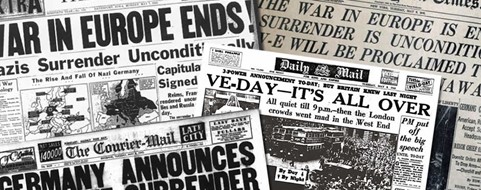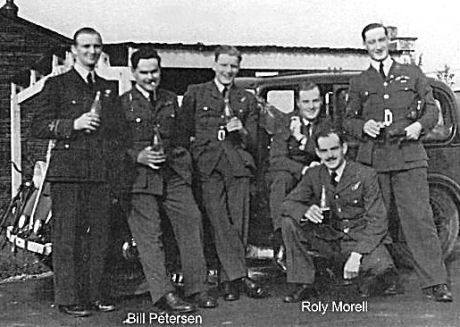News
News
Victory in Europe – Eighty Years Ago
8 May 1945—Victory in Europe Day—marked the end of six long years of war on the European front. For the thousands of New Zealanders serving with the Royal Air Force in Britain, VE Day was a day of triumph, reflection, and bittersweet emotion. For their families at home, there was a mixture of relief, pride and grief. While they could all be proud of the contribution of the ‘Bomber Boys,’ many mourned for those who would never return home.

The newspapers of the day had only one story
Up and down Britain people celebrated in cities, towns and villages on VE Day. Meanwhile, on their bases, RAF squadrons typically paraded then most personnel were dismissed for two days of fun, although some personnel still had ops to fly the next day.

Bill Petersen and crew from 102 Sq. at Polkington VE Day
(Credit: NZBCA Archives)
RAF Metheringham
On VE Day, personnel at RAF Metheringham were stood down from operations and prepared to celebrate Victory in Europe with a huge dinner dance. The Repair and Inspection hangar was hastily turned into a dance hall to accommodate the evening’s entertainment and strips of “Window” (foil strips normally dropped from aircraft to confuse enemy radar) were suspended from the hangar roof as decorations.
The station band assembled to provide a musical accompaniment to the evening’s proceedings and locals from the surrounding villages were invited on to base to participate in the celebrations. Each mess provided a well-stocked bar (local breweries had been asked to provide extra ale!) along with food that had been prepared in the messes during the day.
Even as the station danced the night away, some crews were informed that they would be flying the next day. Several 106 Squadron crews took part in “Operation Exodus” flights to repatriate Prisoners of War back to the UK including flights on VE Day itself. Celebrations continued for several days, some formal, others less so.
Personnel from RAF Metheringham were among many that attended a parade in Lincoln city centre to mark the end of the war in Europe.
75 (NZ) Squadron
From Wireless Operator F/Sgt Gerry Newey’s diary:
7 May: Took Betty to the camp show. Peace will be declared tomorrow at 3 PM. by Winston Churchill. The boys had flares going until about 2 AM.
Gerry was posted out on V.E. Day so he does not record any of the happenings at Mepal, but he wrote on 8 May:
Caught a taxi for Ely at 2.45. Left Ely on 3.40 for Leeds. Flags all along the line. Big celebrations in Leeds where I arrived at 8.45. People just about going crazy at the sight of the streetlights which are very nice to see although they seem out of place.
The 75 Squadron logbook records that a Station Parade was held at 14.30 hours to mark VE Day, and the Prime Ministers speech was heard. The Parade was dismissed by the Station Commander, who stated that all personnel not on essential duties were free for the rest of the day. Eight aircraft were detailed for Supply Dropping at Rotterdam. This mission was uneventful but considered successful.
Station Commander, Group Captain Campbell later recorded that ‘V.E. Day itself was celebrated with excellent spirit, and all ranks conducted themselves admirably; there was no damage or lack of discipline, and the only absentees were a very few who were actually on leave or pass at the time and overstayed – there was undoubtedly some genuine misunderstanding of the press notices of “48 hours ‘free’ leave..
Now that operations have shrunk to two or three BAEDEKER flights per day, there is an atmosphere of dullness. Morale and discipline are good, and there are no signs of active discontent, but there are signs, naturally enough, of apathy.
… we are at present in the transition stage of a routine geared to operations, without the operations.’
467 RAAF Squadron
Typical of many squadrons, No. 467 (RAAF)’s Operations Record Book (ORB) records that parade was held on the morning of VE Day, then in the evening No.2 Hangar was ‘the centre of gaiety’. The beer reportedly lasting until nearly 23.30 “which was a good effort considering the thirsty crowd.”
Noticeable in the ORB from 467 RAAF squadron is the comment for 8 May that ‘All the station are to be congratulated on their behaviour, for although everyone had a jolly time no undue roughness developed and both the Officers’ and Sergeants’ Messes were still standing at the end of the day’.
Lincoln
The streets and. pubs of Lincoln and other towns near RAF bases elsewhere were full to overflowing. ‘Lincoln prayed – and then went wild’ is how the Lincolnshire Echo headlined its report about happy revellers dancing and singing in the streets of Lincoln.
The Echo of May 10 reported: ‘Scenes of wild enthusiasm possibly never before equalled in the city, took place in Lincoln High Street on the night of VE-Day.
From dusk onwards thousands of happy cheering people, including service men and women of the United Nations, paraded the street between the Stonebow and the L.M.S. crossing, or stood in singing groups, or danced in rings to their own vocal accompaniment.
Many of them had been on South Common at nine o’clock to hear the relay of the king’s broadcast speech and see the lighting of the city’s gigantic bonfire by the mayor.”

The Mayor of Lincoln Councillor H. Bennett gave the official announcement of the end of the war in Europe on May 8, 1945,
following Winston Churchill’s speech that was broadcast to the crowd.
(Image: Lincolnshire Echo)
May 15, 2025